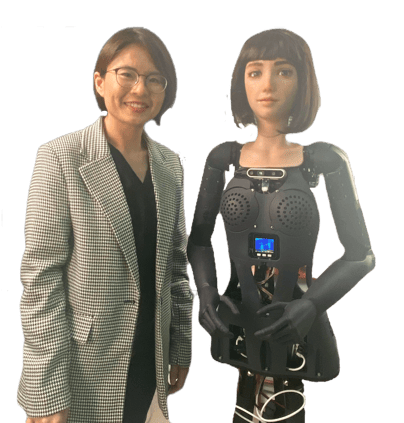[Image courtesy of SUSS Minor program in Applied Aging Studies]
Social robots equipped with Artificial Intelligence may one day join a suite of interventions as alternatives to medication to support people living with dementia who are experiencing agitation, restlessness, anxiety and other symptoms.
Prudence Chan, a Consultant Occupational Therapist and Dementia Care Specialist, has been working closely with aged care providers in Singapore over the past six years trialling robot prototypes to test their potential in aged care.
Ms Chan, Clinical Director of the Singapore-based Pacific Rehab Group, will discuss her insights into piloting socially-assistive robots (SARs) and their potential role supporting someone with dementia at the International Dementia Conference in Sydney later this year.
Ms Chan said an area of need where these robots can help is in providing engaging or calming social interactions to a person experiencing behaviour and psychological symptoms of dementia (BPSD). Where a resident is restless, the technology could assist staff as an alternative to pharmacological options.
“There is emerging evidence that social robots are capable of genuinely improving quality of life for people in long-term care,” she said.
“A person who is experiencing BPSD, like demanding to go home, can be engaged by these robots,” she said.
An assumption in the trials was that a robot could never replace the primacy of “human touch”, or staff involvement, in caring for someone with dementia.
A growing number of older people, including those with dementia, and a lack of care workers, is prompting serious interest in robots in Singapore as a way of helping staff to maintain care quality, she said.
Key principles that have emerged from the trials include the need for person-centred care as the focus for use of robots. User-led design and the right environment are required to support the technology. Gaining acceptance of all care staff to support the technology will also minimise risk of failure.
Drawbacks that emerged during the trials included unclear privacy protection. Robots may have sensors and cameras installed that collect personal information, including facial recordings. Reliable Wi-Fi is essential.
Ms Chan said that among her learnings using the prototypes was that the primary purpose of each of the different forms of social robot should be matched to the needs of the person living with dementia.
KEBBI Air, a Taiwanese-made table-top robot available in range of character skins, is ideal for music and movement activities and is capable to providing storytelling, conversational role to support individuals with dementia.
Paro, a robotic seal, is effective at calming and comforting someone experiencing distress. It is the size and weight of a six-month baby.
For group exercises and games like Bingo, the Singaporean-developed humanoid DEXIE is one of the prototypes being trialled now.
DEXIE, who looks like a seated woman, has plenty of functionality but the high price point a possible barrier to technological adoption amongst care homes.
Another prototype was the Japanese-made LOVOT, a social robot that its maker claims “makes you happy”. LOVOT comes in a variety of cute forms, can use its many sensors to detect the mood of human using it.
While not part of the trial, Ms Chan noted the Hong Kong-based Hanson Robotics and the AI-enabled, voice-activated healthcare worker Grace, prototype is showing potential.

According to the manufacturer, Grace can be “repurposed” to provide counselling or psychotherapy sessions as well as taking vital signs of patients – simulating the role as a nurse in a healthcare facility.
Other presentations on robotics and technology at International Dementia Conference include a detailed evaluation of HUG, a commercially therapeutic comforter that includes a soothing heartbeat, weighted limbs and programmable music player.
[Image courtesy of Hansen Robotics]
The biennial International Dementia Conference is being held at the Sydney Hilton on September 5-6. IDC2024 is being run by The Dementia Centre, which over almost 30 years has provided world-leading research, consultancy and education in the field of dementia care.